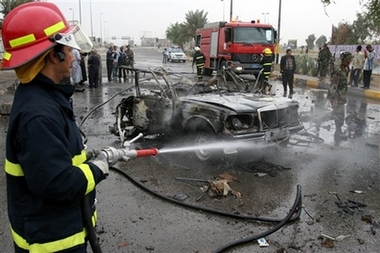Iraq ends some joint checkpoints
(AP)Updated: 2006-11-01 09:23
BAGHDAD, Iraq - Exploiting GOP vulnerability in the November 7 elections, Prime Minister Nouri al-Maliki flexed his political muscle Tuesday and won US agreement to lift military blockades on Sadr City and another Shiite enclave where an American soldier was abducted.
US forces, who had set up the checkpoints in Baghdad last week as part of an unsuccessful search for the soldier, drove away in Humvees and armored personnel carriers at the 5 p.m. deadline set by al-Maliki. Iraqi troops, who had manned the checkpoints with the Americans, loaded coils of razor wire and red traffic cones onto pickup trucks.
|
|
Their departure set off celebrations among civilians and armed men in Sadr City, the sprawling Shiite district controlled by the Mahdi Army militia loyal to anti-American cleric Muqtada al-Sadr. Small groups of men and children danced in circles chanting slogans praising and declaring victory for al-Sadr, whose political support is crucial to the prime minister's governing coalition.
The prime minister's challenge to US conduct of the war was the latest in a series of acts designed to force the American hand and test Washington's readiness to give him a greater say in securing the world's most violent capital.
Al-Maliki finds himself in a maze of conflicting political pressures. After the Bush administration unveiled a plan last week for Iraq's government to adopt timelines for progress, especially in curbing violence, al-Maliki accused Washington of infringing on national sovereignty. There was no doubt he was talking tough to show both the Americans and his political base that he would not be pushed around.
The prime minister has further said that he feels stanching bloodshed might be better handled by Iraqi forces, although his argument does not wash given the present state of his military. Defense Secretary Donald H. Rumsfeld endorsed a proposal Tuesday to spend at least US$1 billion to expand the size and accelerate the training and equipping of Iraqi security forces, underscoring the Bush administration's effort to shift more of the burden away from US troops.
Sen. Jack Reed, a member of the Armed Services Committee, said al-Maliki was yielding to sectarian pressure and undermining US efforts to curb attacks. "Today, the critical issue in Iraq is whether the Maliki government can muster the political will to confront those who use violence to destabilize Iraq," Reed, a Rhode Island Democrat, said in a statement.
Al-Maliki's move Tuesday came three days after his closest aide, Hassan al-Suneid, said unabashedly that the prime minister was trying to capitalize on American voter discontent with the war and White House reluctance to open a public fight with the Iraqi leader just before the midterm election. Much of the discontent is fueled by soaring death tolls among US troops and their inability to contain raging sectarian violence 3 1/2 years after the ouster of Saddam Hussein.
The US military announced the deaths of two soldiers in fighting in the Baghdad area Monday, one from small arms fire, the other from a roadside bomb. The October death toll stood at 103, the fourth highest monthly figure of the war.
More than 40 Iraqis were killed or found dead across the country Tuesday, including 11 Shiites who perished in a suicide car bombing at a wedding on the north side of the capital. Four of those killed at the bride's home were children, and among the 21 wounded were several youngsters with burns over much of their bodies.
| 1 | 2 |  |
|
||
|
||
|
|
